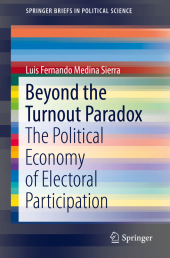 Neuerscheinungen 2018Stand: 2020-02-01 |
Schnellsuche
ISBN/Stichwort/Autor
|
Herderstraße 10
10625 Berlin
Tel.: 030 315 714 16
Fax 030 315 714 14
info@buchspektrum.de |

Luis Fernando Medina Sierra
Beyond the Turnout Paradox
The Political Economy of Electoral Participation
1st ed. 2018. 2018. x, 93 S. 9 SW-Abb. 235 mm
Verlag/Jahr: SPRINGER, BERLIN; SPRINGER INTERNATIONAL PUBLISHING 2018
ISBN: 3-319-73947-6 (3319739476)
Neue ISBN: 978-3-319-73947-2 (9783319739472)
Preis und Lieferzeit: Bitte klicken
This Brief uses game-theoretic analysis to debunk the turnout paradox and offers an alternative economic model to elucidate the patterns behind the socioeconomic bias in turnout. The author argues that the turnout paradox-the idea that rational, strategic actors would not vote in an election-is an overstated problem, and that, contrary to widespread belief, game-theoretic models of elections with highly realistic parameters are compatible with high turnout. The author applies the method of stability sets to the study of voting games so as to characterize the behavior of electoral turnout in response to the game´s structural parameters. To illustrate the power and potential of this framework, the author then develops a politico-economic model that generates testable theories about the way in which the modern welfare state and redistribution of wealth can shape the patterns of biased turnout that exist in most democracies. By turning a classic problem of rational choice into a source of new methods of analysis this Brief allows game theory to intervene in relevant conversations about the political economy of electoral participation, creating an opportunity for formal methods to make a welcome contribution to the discipline. As such, this Brief will be of use to scholars and student of political science, economics, political economy, and public policy, especially those who work in the tradition of formal methods.
Chapter 1: Beyond the Voter´s Paradox.- Chapter 2: A General Model of Strategic Voting.- Chapter 3: The Stability Analysis of Voting Games.- Chapter 4: Electoral Participation Bias and the Welfare State.- Chapter 5: Toward a Structural Theory of Turnout.


